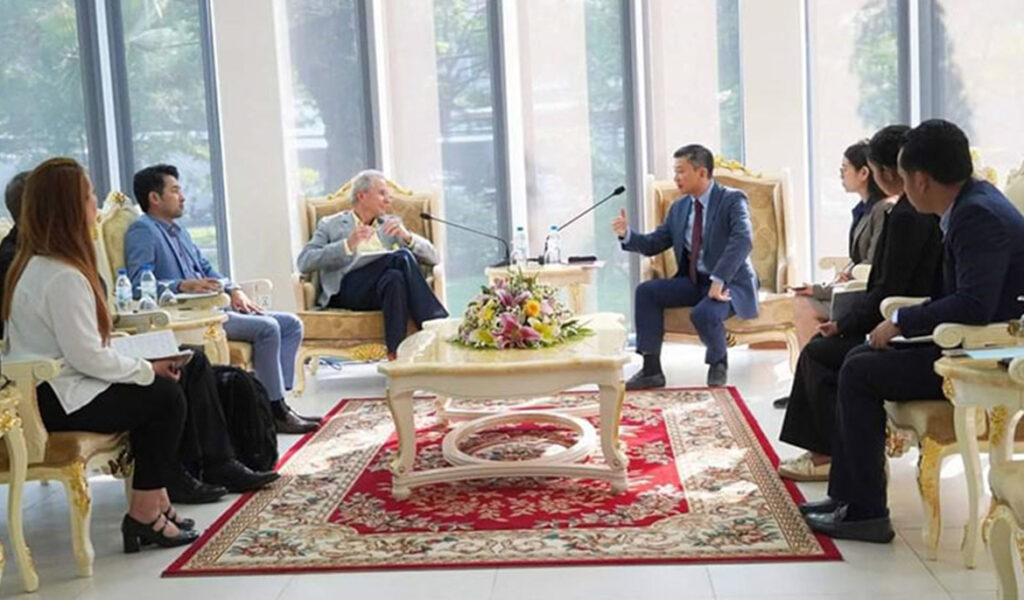A set of incentives awaits investors who can provide skills development training for employees in their Cambodia businesses, reminded the Council for the Development of Cambodia (CDC) recently.
The Investment Law of the Kingdom guarantees incentives to all investors who spend for the training of their employees, Sar Senera, Deputy Secretary General of the Cambodian Investment Board of the CDC told a visiting delegation from Pragma Corporation, an international development consulting firm.
Pragma Corporation representatives, led by Henri Stetter, Senior Advisor of Private Sector Development, visited the Kingdom as part of a study to understand Cambodia’s future human resource needs and its investment-attracting policies in preparation for organizing the ‘Employ’ project in the country with the sponsorship of the United States Agency for International Development (USAID).
The project will focus on developing skills in key economic sectors, as well as promoting vocational training in close partnership with the private sector to ensure effective job matches as per the needs of employers.
The ‘Employ’ initiative of USAID is designed to equip Cambodians with job skills tailored to sectors that are driving inclusive and sustainable growth and economic diversification.
By working directly with and through local partners such as private businesses, universities, and vocational training institutions, the initiative will get Cambodia’s emerging workforce ready with the skills and knowledge that allow them to compete for and thrive in the jobs of tomorrow, according to USAID.
The Employ project, expected to be launched in Cambodia by the end of August this year, will also emphasize improving the capabilities of women and youth in science, technology, and innovation, concentrating on areas like the green economy, STEM-related fields, digital technology, and manufacturing, among others.
Meanwhile, Prime Minister Hun Manet recently stated that in the past six months of the new Royal Government, 173 investment projects have been registered at CDC with a total investment of $4.15 billion, creating more than 170,000 jobs.
He made this statement on the occasion of presiding over a plenary meeting of the Council of Ministers at the Peace Palace last Friday.
Mr Hun Manet noted that the Royal Government is actively working to improve the investment climate and incentives to boost socio-economic activities and increase employment opportunities.
The Prime Minister added that most foreign investors acknowledged the potential of Cambodia and were happy to invest in the Kingdom.
It may also be recalled that Cambodia has started implementing a massive skills training initiative aimed at upskilling 1.5 million youth from poor and vulnerable families in a bid to improve their economic prospects.
According to the findings of the Asian Development Bank (ADB), the share of Cambodians engaged in medium- and higher-level technical occupations constitutes only 10.7 percent of the total labour force in the country. This indicates the non-availability of suitably skilled local hands for such jobs and that many industries and service sectors in Cambodia are relying on foreign experts to fill those positions.
The government is fully aware of the need to address this handicap and is now in the process of addressing the issue with the cooperation of the public and private sectors.
A Concept Paper of ADB revealed that Cambodia has a population of 16.7 million, 65 percent of whom are younger than 30 years old. The school completion rates in the country remain low, with only 7.4 percent of the labour force having completed some form of post-secondary education.
The labour productivity in Cambodia calculated as $3.6 per hour worked remains lower than that of several other countries in the Southeast Asian region such as Vietnam ($7.3) and Indonesia ($13.1). This low productivity has been widely attributed to the absence of adequate skills education. Khmertimeskh



